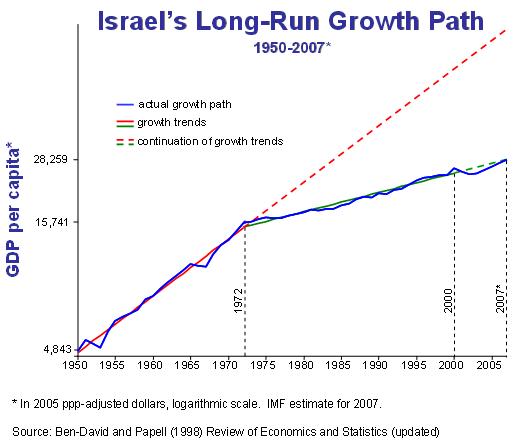|
PDF file
published
in Haaretz on November 22, 2007.
From 1948 to 2008
by Dan Ben-David According to recent IMF data, living
standards in Israel – as reflected in GDP per capita – are expected to rise
this year by 3.3%. On the one hand, this
will be the fourth straight year with such high growth rates. On the other hand, these years reflect a
recovery period that comes on the heels of a severe recession. As can be seen in the graph, the four
consecutive years of fast growth since 2003 are indicative of nothing more than
a return of Israel’s economy to the problematic long-run growth path that has
characterized it between the 1973 turning point and the outbreak of the
intifada in 2000. This slow-growth long-run path
reflects a relative decline in Israeli living standards, compared with the
leading western countries. For example, countries
like the G7, who were wealthier than us in the mid-1970s, have grown faster
since then (2.1% in the G7 versus 1.7% per year in Israel) – despite the past 4
years. The further behind Israel’s
living standards fall, the more attractive life abroad becomes for many
Israelis whose skills and training are in demand overseas. This is not some abstract or distant
theoretical issue, but rather a very real crisis already in full swing. The rate of emigration from Israel by
physicians is greater even than that of high tech professionals. The high out-bound rate of physicians is
exceeded by the emigration rate of university professors, which is greater than
that of every other group in the country.
How severe is the situation in Israeli
academia? While the number of European
professors in the States is between 1% to 4% of the total number of professors
in their respective home countries, the number of Israeli professors in the
States is 25% of the total number of professors remaining in Israel. Nothing in the western world even remotely
compares to this rate of emigration. The problematic path that we are on is
the result of very low employment rates and low labor productivity rates, and
this despite a high-tech sector that is thriving on a global scale. Israel’s education system, which has become
the worst in the western world, is one of the main reasons for the decline. In addition, there are large population
groups that are increasingly disengaging themselves from Israeli society. For example, the majority of the ultra-orthodox
and Israeli-Arab populations are not employed, nor do they participate in preserving
or defending their way of life. If, just
one generation ago, the children of these groups made up one-fourth of the
primary school pupils, today they comprise half the kids in the lower grades. The State of Israel is situated on a
growth path that is unsustainable in the long-run – especially when taking into
consideration poverty and inequality trends that have been steadily increasing
since the 1970s. The implication of an
unsustainable path is that we can expect a clear and inevitable break point in
the path’s future, whether this is the result of intentional, well-informed
government policies or whether this results from a tremendous social explosion
that may lead to the salvation of the country the hard way – or to its demise. In 1948 we attained independence. This coming year, 2008, Israel will celebrate
its 60th birthday. The country has come full circle during its
first 6 decades. Against all odds, extraordinarily
strong foundations were built in defense, education, science and health during
the first decade of the new-born country.
These seedlings, planted and nurtured by our parents – who sacrificed so
much to ensure their survival and growth – endowed Israel with a large amount
of subsequent breathing space that enabled us to weather the dysfunctional
leadership, the distorted national priorities and the cultural deterioration
that has characterized such large swaths of the past three decades. We have squandered the degrees of
freedom bestowed upon us by our founding fathers. So next year, 2008 – as in 1948 – marks the
beginning of a decade in which our generation will or will not exhibit the
wherewithal to implement the policies that determine if the country will reach
its 120th birthday. comments
to:
danib@post.tau.ac.il
|
